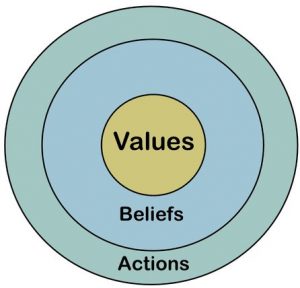
What are core values? Core values are the internal, deeply held values that support your beliefs, which drive the actions you take. They are the essence of you.
It amazes me how few individuals have taken time to define their core values. Sure, companies have core values. If a company truly lives its core values, the leaders will fire a top employee or top client for violating those values—without exception. Jim Collins explains the concept further in his book “Built to Last,” a precursor to “Good to Great.”
Unfortunately, many companies tout values such as “honesty.” I’ve led dozens of workshops helping companies dig down to identify their true values. “Honesty” always pops up. Following Jim Collins’s standards, I ask, “Do you really want each employee to be 100% honest with clients and coworkers 24/7 year after year?”
After thinking about it, the companies take honesty off their values list. “Honesty” sets the bar too high.

Your personal core values, as shown in the circle above, drive your beliefs, and your beliefs drive your actions. If you act against your core values, that conflict will eat at you until you resolve it. Or it may well result in poor health, either physically or emotionally.
Take an hour some weekend to determine your personal core values. We have an exercise to help you do that, which is how I determined my core values.
If our core values exercise doesn’t work for you, try the approach offered in this Psychology Today article.
When I first did my core values, probably at least 15 years ago, I ended up with these:
I was able to remember them easily because they spell CHEF when rearranged. And I love to cook.
Since then, I have developed a much stronger relationship with God, so I’ve added Faith to the list. You owe it to yourself to identify your core values.
I spent a couple years before MentorLoft coaching high school and college students to help them find the right major for them. As a result, I highly encourage families to develop family values. Those family values will help your kids make the right decisions as they grow up and leave the nest.
Think about all the challenges facing a college freshman—it’s a whole new world with lots of decisions to be made when neither mom nor dad is around. A student is far more likely to make the right decisions if he/she is firmly grounded in the family’s values.
Years ago, I went into a partnership with another independent consultant. We were two very bright women who shared a passion for helping others learn and grow. We came up with a great company name and an award-worthy brand image. We had great content and great enthusiasm.
What we didn’t have was shared company values. I had my personal core values; my partner had hers. And we never talked about any of it. We were just off to save the world.
After a year or so, the cracks started to show up in our partnership. Our core values were not at all similar; in fact, they clashed. I got to the point where I couldn’t even stand to talk about the company or my partner.
It was time for a divorce.
Breaking up our partnership was painful and messy. I now understand why people called such a break-up a “divorce.” We were legally tied together, just like in a marriage, and had to dissolve everything legally.
I was left with a ton of award-worthy letterhead, business cards, a website and more. I estimate that experience cost me $10,000. But it also taught me the importance of core values.
Are you familiar with Patrick Lencioni’s books? If not, you need to be. Here are two of my favorites. In this Harvard Business Review article, Lencioni shares his take on business core values—the good, the bad, and the ugly. Check it out if you are running a business or on a leadership team.
This excerpt from the Dummies book on conflict resolution at work talks about what happens when employees’ core values clash. Take a few minutes to gain insights on conflict in the office.
This article describes Buffer’s search for its core values and the pain the company incurred. The article also includes values from seven companies known for the quality of their values. And it gives a checklist for rating your own firm’s core values. Check it out.
© Pamela A. Scott, MentorLoft.com, 2017